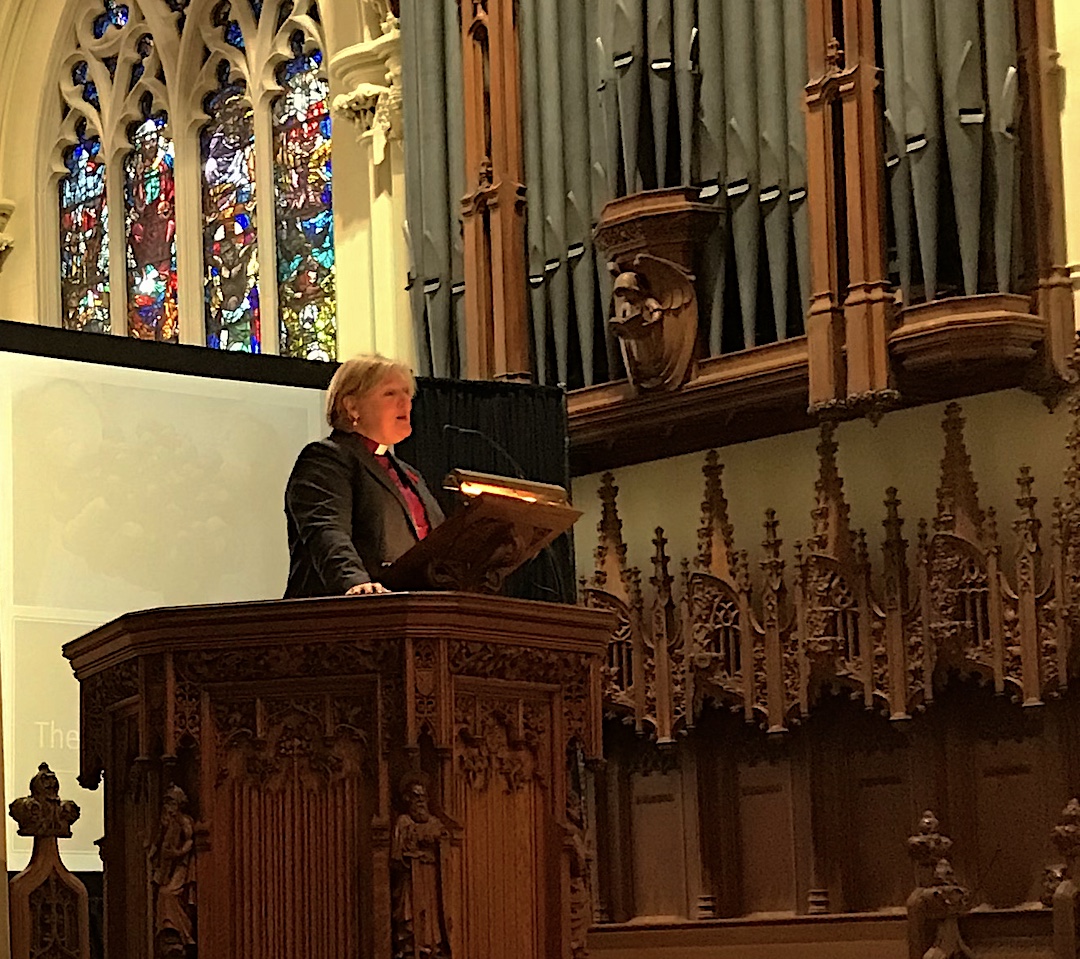“I know the God who will not let our foot be moved, the God who watches over us, the God from whom our help comes has got us and our beloved church … in this work.”
With these words of hope and assurance, Bishop Susan Bell concluded her first charge to the 144th Niagara Synod.
She began by taking delegates back approximately 2,800 years to the prophet Isaiah because, although God’s people were in exile, Isaiah’s message is “comforting — and challenging — promises of redemption”.
Even though our past is important, we should not get bogged down there, said the Bishop. “If we are so taken by how things used to be and can’t let go of that mirage, then we will miss whatever the new thing is that God is doing in our present.”
Citing personalities throughout history, she reminded delegates that we live in a “dynamic, ever shape-shifting time” and everything we try may not work, but “we’ll learn together through the trying. And we’ll be diligent with the harvesting of lessons as we go — and responsible with our resources”.
Experimentation and change may be the new normal, said Bishop Susan, and that could be exciting, “once we’ve disentangled ourselves from the parts of our past that have bound us.”
The gospel is the same good news delivered by Jesus Christ even though “it has worn different clothes in every age,” she continued, and “we’re still trying stuff on for size in our age”.
“The wine is the same wine, but new skins are waiting.”
She has witnessed tremendous creativity in her visits to parishes. “I mean creatively inhabiting what is best of our tradition and restoring meaning to our actions where we’ve perhaps taken meaning for granted.” She named spiritual formation groups, vibrant liturgies, engaging new constituencies and supporting those living on the margins as examples.
Noting the letting go of a program mindset and cultivating a more relational stance towards communities, she told delegates we need to “figure out that we can’t — and probably shouldn’t — do it all … and concentrate the mind rather on what we can be doing as church”.
Even with “fewer people and fewer dollars with which to do ministry” today, she noted, “one of the new things we are being asked to do is remember that if we plant and do some watering, God gives the growth!”
She suggested the diocese needs to renew the culture of stewardship, one built on “relationships, as well as financial resources”. Our stories should not be about scarcity and survival but about “what God is growing in and through us”.
A focus on leadership, lay and clergy, was also recommended in the charge, with the Bishop mentioning new efforts for lay involvement and an enhancement for clergy continuing education. In the future, the Clergy and Licenced Lay Workers Conference will be fully funded so all can attend.
As part of the work of renewal and mission, Bishop Susan announced, beginning in Epiphany, “I will be asking us all across the diocese to commit to participate in One Thing — one spiritual practice or Christian education tool or missional action that will help renew and enliven our relationship with God. The idea is that we will begin to share stories, participate in workshops, take on spiritual practices and celebrate the God who has given us more than we can ask for or imagine.”

Calling properties valuable diocesan assets, the Bishop reminded delegates that parishes and church buildings must be established where the mission fields are and that may mean redeploying some present assets. “When it is very clear that they have come to the end of their life cycle it is incumbent on us — the stewards of those resources — to redeploy those assets as needed for a new mission field — as intended by their founders: Christians who gave money to the church to be the church.”
“This is an important thing for us to understand,” she said, since our mission as a church is to “make disciples and preach the Gospel to the whole of creation”.
In order to become a planting church again, the Bishop noted decisions have to be made based on “understanding the needs of new housing surveys; of underserviced inner-city neighbourhoods; strategic small-town locations. These are some of the contexts that we are learning about and planning to engage.”
A new committee to examine and explore all aspects of Niagara’s properties and strategies is being formed.
“This is the job of tilling the soil and planting seeds for the next season of our beloved church.”
While travelling around Niagara Diocese, Bishop Susan also noticed a growing appreciation for shared leadership, partnering in community with values-based organizations, developing gifts inventories to reform and strengthen ministries, listening to the needs of communities, reinventing who we are in and for the world and returning to God “our eternal enduring strength”.
After acknowledging the value of the diocesan vision which served Niagara so well for the past ten years, Bishop Susan spoke of “carrying forward our Diocesan vision into its next iteration”.
“The Gospel is not easy. It never was,” she recapped, “and we are called to struggle with it — interpret it for our culture — live it for our communities and our people.
Disability Theology and it’s Promise for our Church